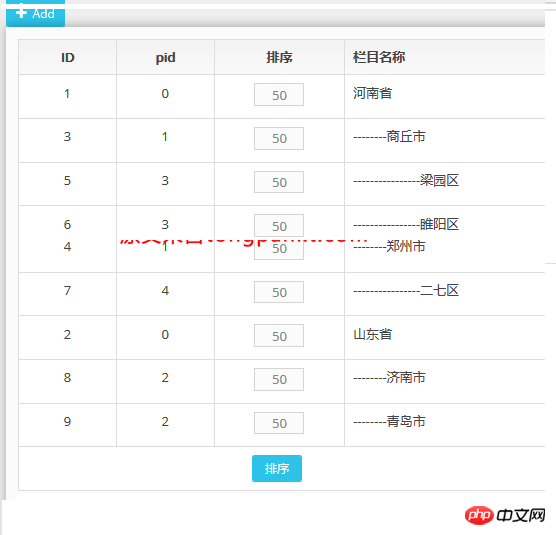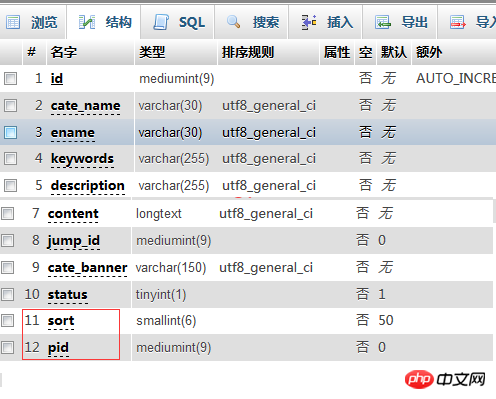 Backend Development
Backend Development
 PHP Tutorial
PHP Tutorial
 The sorting implementation code of infinite columns in thinkphp
The sorting implementation code of infinite columns in thinkphp
The sorting implementation code of infinite columns in thinkphp
The content of this article is about the sorting implementation code of unlimited columns in thinkphp. It has certain reference value. Friends in need can refer to it. I hope it will be helpful to you.
We did not specify in the question whether it is the infinite sorting of tp5 or the infinite sorting of tp3, just to let the novices understand that the implementation of these functions has nothing to do with the framework you use, no matter you are tp5 It doesn't matter whether it is TP3, laravel or yii framework. What we emphasize is the idea and the method to solve the problem. During the demonstration, it doesn't matter because I am using TP3.
The sorting of unlimited columns is very simple. We have explained it many times. This time we will share with you the solution in the form of a blog post.
Above picture:

The above picture is the infinite level classification we have implemented. We should pay attention to two fields, id and sort field. Currently, the sort field The values are all 50, which is the default value. Then I will take a screenshot of the data table structure for everyone

The sort in the above picture is used to achieve sorting pid is used to achieve infinite classification
The key to achieving infinite classification is us To write the sorting field, we get the entire code, but only one line is used:
[php]
<form method="post" action="">
<table class="table table-bordered table-hover">
<thead class="">
<tr>
<th width="6%" class="text-center">ID</th>
<th width="6%" class="text-center">pid</th>
<th width="8%" class="text-center">排序</th>
<th>栏目名称</th>
<th width="16%" class="text-center">操作</th>
</tr>
</thead>
<tbody>
<volist name="cateRes" id="cate">
<tr>
<td align="center">{$cate.id}</td>
<td align="center">{$cate.pid}</td>
<td align="center">
<input type="text" name="sort[{$cate.id}]" value="{$cate.sort}" /></td>
<td><?php echo str_repeat(‘-‘, $cate[‘level’]*8);?>{$cate.cate_name}</td>
<td align="center">
<a href="" class="btn btn-primary btn-sm shiny">
<i class="fa fa-edit"></i> 编辑
</a>
<a href="#" onClick="warning(‘确实要删除吗’, ”)" class="btn btn-danger btn-sm shiny">
<i class="fa fa-trash-o"></i> 删除
</a>
</td>
</tr>
</volist>
<tr>
<td colspan="4">
<button
type="button" tooltip="排序" style="margin-left:225px; width:50px;"
class="btn btn-sm btn-azure btn-addon">排序</button>
</td>
</tr>
</tbody>
</table>
</form>
[/php]From the above code, we can see that the entire table is wrapped in a form, because we want to submit the sorting field. So a form is needed.
The core code for our implementation of infinite column sorting:
[php]
<input type="text" name="sort[{$cate.id}]" value="{$cate.sort}" />
[/php]This is the sentence. In fact, we assembled a sort[] array. The key of each element of the entire array is the current column. The id and value are the sorted values of the current column, so that once we submit the array, we can modify the sort according to the id
Full code:
[php]
public function lst(){
$cate=D(‘Cate’);
if(IS_POST){//排序
$data=I(‘sort’);
foreach ($data as $k => $v) {
$cate->where(array(‘id’=>$k))->save([‘sort’=>$v]);
}
return;
}
$cateRes=$cate->cateTree();//无限级分类树
$this->assign([
‘cateRes’=>$cateRes,
]);
$this->display(‘list’);
}
[/php]Related recommendations:
How to use recursion to achieve infinite grading under the TP5 framework (code example)
What are the methods of intercepting strings in thinkphp5? (Two methods to achieve)
The above is the detailed content of The sorting implementation code of infinite columns in thinkphp. For more information, please follow other related articles on the PHP Chinese website!

Hot AI Tools

Undresser.AI Undress
AI-powered app for creating realistic nude photos

AI Clothes Remover
Online AI tool for removing clothes from photos.

Undress AI Tool
Undress images for free

Clothoff.io
AI clothes remover

AI Hentai Generator
Generate AI Hentai for free.

Hot Article

Hot Tools

Notepad++7.3.1
Easy-to-use and free code editor

SublimeText3 Chinese version
Chinese version, very easy to use

Zend Studio 13.0.1
Powerful PHP integrated development environment

Dreamweaver CS6
Visual web development tools

SublimeText3 Mac version
God-level code editing software (SublimeText3)

Hot Topics
 How to run thinkphp project
Apr 09, 2024 pm 05:33 PM
How to run thinkphp project
Apr 09, 2024 pm 05:33 PM
To run the ThinkPHP project, you need to: install Composer; use Composer to create the project; enter the project directory and execute php bin/console serve; visit http://localhost:8000 to view the welcome page.
 There are several versions of thinkphp
Apr 09, 2024 pm 06:09 PM
There are several versions of thinkphp
Apr 09, 2024 pm 06:09 PM
ThinkPHP has multiple versions designed for different PHP versions. Major versions include 3.2, 5.0, 5.1, and 6.0, while minor versions are used to fix bugs and provide new features. The latest stable version is ThinkPHP 6.0.16. When choosing a version, consider the PHP version, feature requirements, and community support. It is recommended to use the latest stable version for best performance and support.
 How to run thinkphp
Apr 09, 2024 pm 05:39 PM
How to run thinkphp
Apr 09, 2024 pm 05:39 PM
Steps to run ThinkPHP Framework locally: Download and unzip ThinkPHP Framework to a local directory. Create a virtual host (optional) pointing to the ThinkPHP root directory. Configure database connection parameters. Start the web server. Initialize the ThinkPHP application. Access the ThinkPHP application URL and run it.
 Which one is better, laravel or thinkphp?
Apr 09, 2024 pm 03:18 PM
Which one is better, laravel or thinkphp?
Apr 09, 2024 pm 03:18 PM
Performance comparison of Laravel and ThinkPHP frameworks: ThinkPHP generally performs better than Laravel, focusing on optimization and caching. Laravel performs well, but for complex applications, ThinkPHP may be a better fit.
 How to install thinkphp
Apr 09, 2024 pm 05:42 PM
How to install thinkphp
Apr 09, 2024 pm 05:42 PM
ThinkPHP installation steps: Prepare PHP, Composer, and MySQL environments. Create projects using Composer. Install the ThinkPHP framework and dependencies. Configure database connection. Generate application code. Launch the application and visit http://localhost:8000.
 Development suggestions: How to use the ThinkPHP framework to implement asynchronous tasks
Nov 22, 2023 pm 12:01 PM
Development suggestions: How to use the ThinkPHP framework to implement asynchronous tasks
Nov 22, 2023 pm 12:01 PM
"Development Suggestions: How to Use the ThinkPHP Framework to Implement Asynchronous Tasks" With the rapid development of Internet technology, Web applications have increasingly higher requirements for handling a large number of concurrent requests and complex business logic. In order to improve system performance and user experience, developers often consider using asynchronous tasks to perform some time-consuming operations, such as sending emails, processing file uploads, generating reports, etc. In the field of PHP, the ThinkPHP framework, as a popular development framework, provides some convenient ways to implement asynchronous tasks.
 How is the performance of thinkphp?
Apr 09, 2024 pm 05:24 PM
How is the performance of thinkphp?
Apr 09, 2024 pm 05:24 PM
ThinkPHP is a high-performance PHP framework with advantages such as caching mechanism, code optimization, parallel processing and database optimization. Official performance tests show that it can handle more than 10,000 requests per second and is widely used in large-scale websites and enterprise systems such as JD.com and Ctrip in actual applications.
 ThinkPHP6 backend management system development: realizing backend functions
Aug 27, 2023 am 11:55 AM
ThinkPHP6 backend management system development: realizing backend functions
Aug 27, 2023 am 11:55 AM
ThinkPHP6 backend management system development: Implementing backend functions Introduction: With the continuous development of Internet technology and market demand, more and more enterprises and organizations need an efficient, safe, and flexible backend management system to manage business data and conduct operational management. This article will use the ThinkPHP6 framework to demonstrate through examples how to develop a simple but practical backend management system, including basic functions such as permission control, data addition, deletion, modification and query. Environment preparation Before starting, we need to install PHP, MySQL, Com





